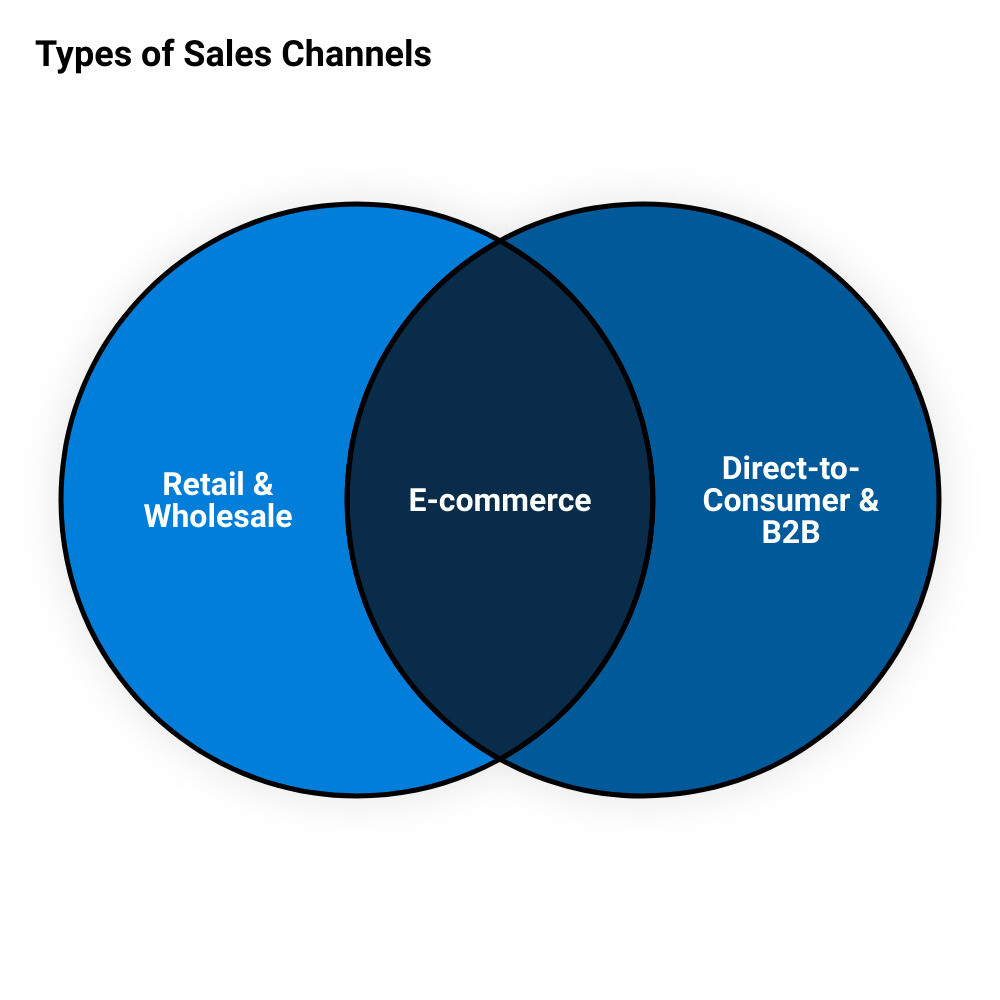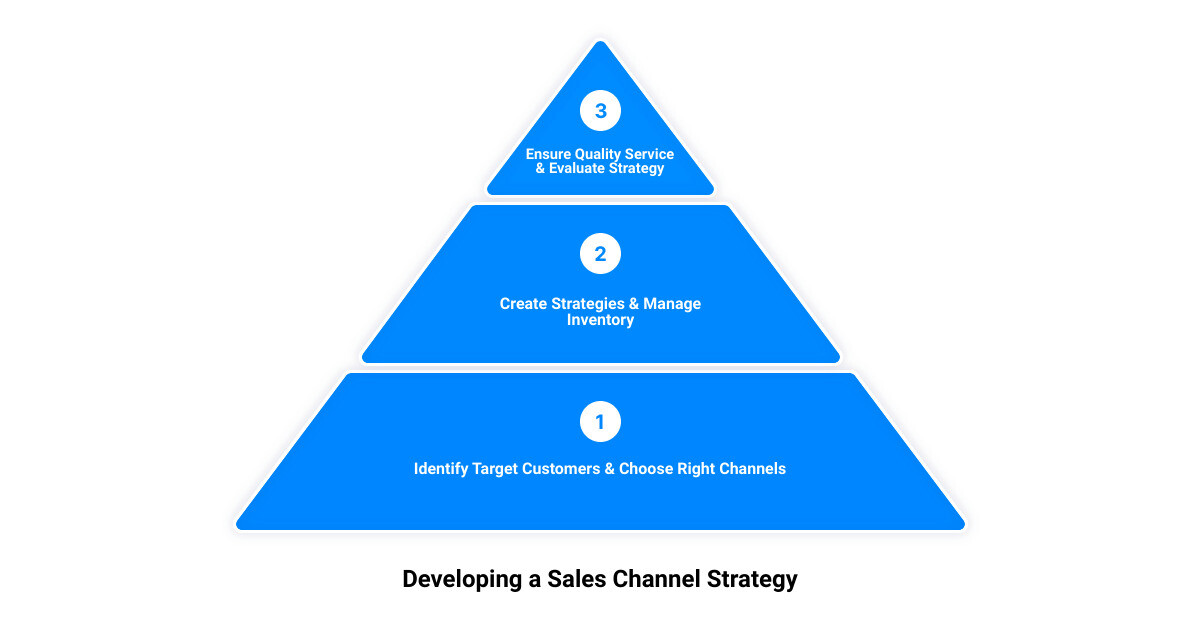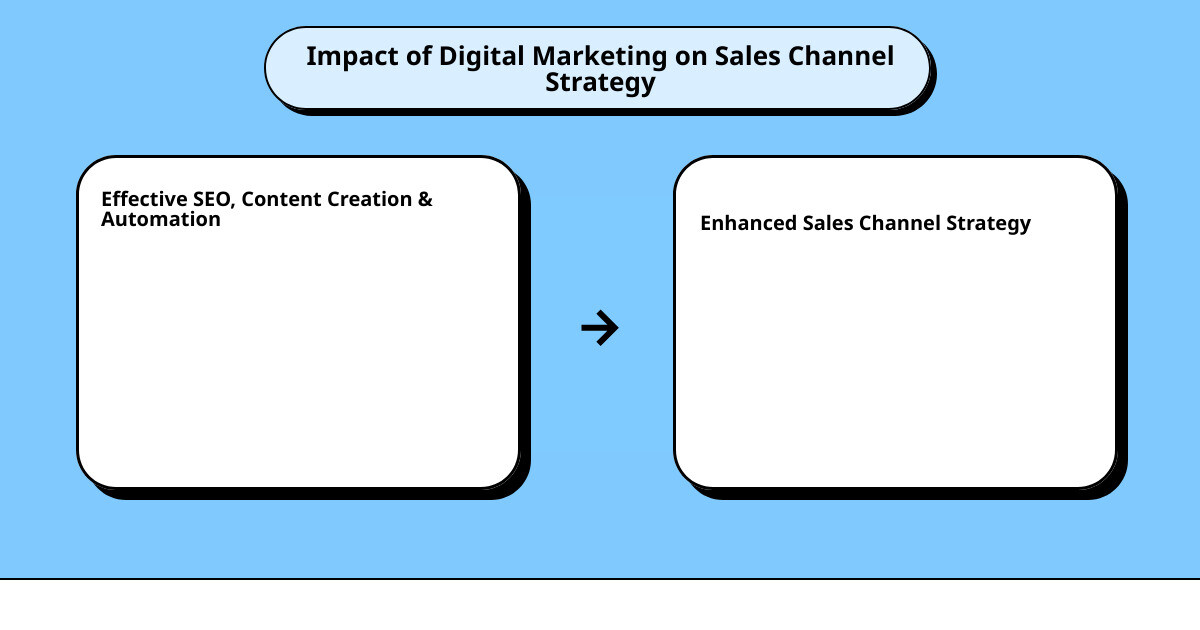Introduction: The Importance of a Sales Channel Strategy
In the dynamic world of business, standing out is not simply a desire; it's a necessity. Companies, especially those in the marketing sector, are constantly searching for strategies to reach more customers, increase sales, and ultimately, grow their businesses. One such strategy that has been proven to be effective is the development of a robust sales channel strategy.
A sales channel strategy is a plan for reaching customers with your products or services. It involves selecting the right sales channels that align with your business goals and your customers' buying habits. It's like crafting a roadmap that guides your products or services to your customers through the most effective routes.
The importance of a sales channel strategy cannot be overstated. It directly impacts your brand's visibility, customer reach, and revenue generation. With the right strategy, you can unlock your business's potential and drive significant growth. Whether you're a head of marketing or digital marketing in a small to midsize business, you understand the challenges of low brand awareness, lead and revenue deficiency, and the need for quality results. A well-thought-out sales channel strategy can help tackle these challenges head-on.
In this article, we will dissect the concept of a sales channel strategy, discuss its importance, and provide a step-by-step guide on how to develop an effective strategy for your business. We will also delve into the role of digital marketing in enhancing your sales channel strategy and provide a case study of a successful sales channel strategy. So, if you're ready to unlock your business potential with a robust sales channel strategy, let's dive in.

Understanding Sales Channels: Definition and Types
In the bustling marketplace of the modern world, businesses need a clear route to reach their customers. This is where sales channels come into play. So, what are sales channels? They are the pathways that a product or service travels from the producer to the final consumer. They are the mechanisms that facilitate the distribution and sale of your offerings, making your product or service accessible to buyers.
To create an effective sales channel strategy, it's crucial to understand the different types of sales channels available and how they can be leveraged to suit your business's unique needs and goals.
The Four Types of Sales Channels: Retail, Wholesale, Direct-to-Consumer, B2B
Firstly, we have retail, where your products are sold directly to consumers through brick-and-mortar stores or pop-up retail stores. This gives you direct contact with your customers, but also brings additional overhead costs and potential customer service challenges.
Secondly, there's wholesale, where your goods are sold in large quantities to retailers, who then sell them to the end consumers. This approach allows you to move large amounts of inventory at once, but requires substantial capital to maintain the necessary inventory levels.
Direct-to-Consumer sales let you bypass retailers and sell your products directly to the end consumer, often through an online platform. This model gives you complete control over the customer experience but may demand more effort in marketing and logistics.
Lastly, B2B (business-to-business) sales involve selling your products or services to other businesses. This can be lucrative due to the typically larger order sizes, but also requires a deep understanding of the needs and challenges of other businesses.
Additional Sales Channels: E-commerce, Social Media, Mobile Apps, White Label
Beyond these four primary types, there are additional sales channels that can be particularly effective in the digital age.
E-commerce, for example, refers to any online transaction and is a rapidly growing channel due to its convenience and the growing preference of consumers for online shopping.
Social media platforms like Facebook, Instagram, and TikTok also serve as modern, content-driven marketplaces that can help you reach consumers where they already spend a significant amount of their time.
Mobile apps are another growing channel, allowing businesses to reach consumers on their smartphones and tablets with a highly personalized experience.
Finally, white label sales involve selling your product to another company to be rebranded and sold under their name. This can dramatically expand your reach and allow you to benefit from your partner's brand recognition.
Understanding these sales channels and their respective advantages and disadvantages is the first step in crafting an effective sales channel strategy. The goal is to find the right mix that aligns with your business model, target audience, and growth objectives.

Developing a Sales Channel Strategy: A Step-by-Step Guide
Developing a robust sales channel strategy is like crafting a master plan for your business growth. It involves a deep understanding of your target market, selecting the right sales channels, devising unique strategies for each channel, managing inventory and fulfillment, ensuring quality customer service, and continuously evaluating and adjusting the strategy. Let's break down these steps for a better understanding.
Identifying Your Target Customers
The first step in developing a sales channel strategy is understanding who you're selling to. This involves conducting a thorough market analysis to understand your customers’ behavior, consumption patterns, needs, and their familiarity with your brand. The better you know your target market, the more effectively you can tailor your sales channels and strategies to meet their needs.
Choosing the Right Sales Channels
Your choice of sales channels should align with where your target audience spends their time and which channels yield the most return on investment. While you might have started with a single channel, expanding your business implies exploring and implementing strategies across multiple sales channels. These could range from traditional retail to e-commerce, social media, and mobile apps.
Creating Different Strategies for Each Channel
Each sales channel you add to your business requires a unique strategy to succeed. For instance, driving traffic to your online store requires different tactics compared to attracting foot traffic to a physical store. This differentiation extends to your marketing messaging and product descriptions. The key is to tailor your approach to each channel, considering its unique characteristics and audience.
Managing Inventory and Fulfillment
As you diversify your sales channels, it's crucial to have the right procedures in place for inventory management and order fulfillment. The more channels you have for making sales, the more inventory you need to meet the demand. You also need to ensure you have the capacity to fulfill all orders, whether by self-fulfillment or via a third-party logistics provider, depending on your business size and needs.
Ensuring Quality Customer Service
As your business grows, so will the number of customer interactions. This makes it crucial to have a strategy in place to provide high-quality customer service across all channels. This could involve hiring customer support representatives, adding live chat to your website, or even using a customer service platform to manage and respond to customer inquiries timely.
Regularly Evaluating and Adjusting the Strategy Based on Performance
Finally, it's essential to regularly evaluate your sales channel strategy's effectiveness. Pay attention to the volume of sales each channel generates and adjust your approach accordingly. If a channel isn't performing as expected, consider a targeted marketing campaign to boost brand recognition and sales. Remember, your strategy should be fluid, ready to adapt to market changes and business growth.
By following these steps, you can create a robust sales channel strategy that not only reaches your target customers but also effectively converts them, driving your business towards success.

Channel Sales: A Deeper Dive
Great, you've started to grasp the importance of a sales channel strategy. Now, let's dive deeper into the world of channel sales, a vital part of any successful sales channel strategy.
Definition of Channel Sales
Channel sales, also referred to as indirect sales, is a sales strategy where a parent company sells its products or services through another company. This method is a staple in the business world, accounting for about 75% of global sales. It's a way to maximize revenue growth by leveraging the reach, expertise, and resources of partner companies. This strategy allows businesses to overcome time and resource constraints, helping them to expand their market reach and increase sales efficiency.
Six Types of Channel Sales: Referral Partners, Resellers, Distributors, Dealers, Agents, Affiliate Partners
When it comes to channel sales, there are six primary types you should be aware of:
-
Referral Partners: These are companies or individuals who refer potential customers to your business. In return, they receive a commission or other form of reward.
-
Resellers: These are businesses that purchase your products or services and sell them to their customers at a different price point. A notable example is StubHub, a ticket reseller.
-
Distributors: These entities act as a middleman between your company and the customer, taking a percentage of the sales for their role.
-
Dealers: These are specialized retailers who focus on selling one specific type of product, such as car dealers or electronics dealers.
-
Agents: These are individuals who oversee the negotiations between buyers and sellers, earning a commission for their work. Real estate brokers are a prime example of agents.
-
Affiliate Partners: These partners receive a commission from the parent company in return for sales generated from their marketing efforts. This is common in influencer promotions.
Each of these channel sales types offers unique advantages and can be leveraged depending on your business needs and goals.
The Role of CRM Software in Channel Sales
Customer Relationship Management (CRM) software plays a critical role in managing channel sales. It provides a centralized platform for tracking sales activities, managing partner relationships, analyzing performance, and forecasting sales.
CRM software can help streamline communication between your company and its channel partners, ensuring everyone has access to the same real-time data. It can also enable better lead tracking, deal management, and performance analysis across different sales channels.
In conclusion, channel sales can be a game-changer for businesses looking to expand their market reach and increase sales efficiency. By understanding the different types of channel sales and effectively utilizing CRM software, you can make the most of this powerful sales strategy.

The Role of Digital Marketing in Sales Channel Strategy
In the digital age, a robust sales channel strategy is incomplete without incorporating digital marketing techniques. It not only enhances the visibility of your brand but also helps in reaching out to a larger audience, building strong relationships, and driving more conversions. Let's delve into how SEO, social media, content creation, automation, and analytics can significantly enhance your sales channel strategy.
How SEO and Social Media Can Enhance Your Sales Channel Strategy
Search Engine Optimization (SEO) is a powerful tool that can significantly improve your sales channel strategy. By utilizing SEO, your brand can rank higher in search engine results, leading to increased visibility and more organic traffic to your website or online store. This increased traffic can convert into leads, customers, and ultimately, increased sales.
Meanwhile, social media platforms act as dynamic sales channels in their own right. With billions of users worldwide, platforms such as Facebook, Instagram, LinkedIn, and Twitter offer a vast audience for your products or services. By creating engaging content and fostering authentic interactions on these platforms, you can generate brand awareness, attract potential customers, and even directly facilitate sales via social commerce features.
The Importance of Content Creation in Attracting Partners
Content is king in the digital marketing world, and its role in attracting partners for your sales channel strategy is no exception. High-quality, relevant content can showcase your brand's value proposition, establish industry authority, and attract potential channel partners.
For instance, blog posts, whitepapers, case studies, and webinars can demonstrate your expertise and the benefits of your products or services. This type of content can attract resellers, affiliates, or other potential partners who see the value in associating with your brand. By creating a content strategy that targets potential partners, you can enhance your sales channel strategy and drive business growth.
How Automation and Analytics Can Improve Your Sales Channel Strategy
Automation in digital marketing can streamline your sales channel strategy by automating repetitive tasks such as email marketing, social media posting, and even some aspects of content creation. This can help you manage your sales channels more efficiently and free up time for more strategic tasks.
On the other hand, analytics can provide valuable insights into your sales channel performance. Using tools like Google Analytics or CRM software, you can track and measure the success of your sales channels. This data can help you understand which channels are performing well, where your customers are coming from, and where there may be opportunities for improvement. By applying these insights, you can optimize your sales channel strategy, make data-driven decisions, and ultimately, boost your ROI.
In conclusion, incorporating digital marketing into your sales channel strategy can significantly enhance your ability to reach potential customers, attract partners, and drive sales. By harnessing the power of SEO, social media, content creation, automation, and analytics, you're not just selling; you're strategically positioning your brand for success in today's digital marketplace.
Case Study: Successful Sales Channel Strategies
Imagine driving your business growth, reaching new markets, and building trust with potential customers all through an optimized sales channel strategy. Sounds like a dream, right? Well, it's not only possible but also achievable. Let's explore a real-world example of a successful sales channel strategy to understand how it can be done.
Example of a Successful Sales Channel Strategy
A classic example of a winning sales channel strategy is the partnership between a catering company and a beverage service company. This partnership allowed both companies to sell their products as a package deal, thereby enhancing the value of their individual offerings. By doing this, they were able to reach a larger customer base, increase their sales, and create a win-win situation for both companies. This strategy is a prime example of how leveraging channel sales can help businesses reach new markets, save time and money, and build trust with potential customers.
However, developing a successful channel sales strategy requires careful consideration of your target customers, choosing the right sales channels, creating different strategies for each channel, managing inventory and fulfillment, ensuring quality customer service, and regularly evaluating and adjusting the strategy based on performance.
How SocialSellinator Can Help Develop Your Sales Channel Strategy
At SocialSellinator, we understand the challenges faced by marketing heads in small to midsize businesses. From low brand awareness to lead and revenue deficiencies, we know the struggle is real. That's why we offer tailored services to help you develop a robust sales channel strategy.
Our team of experts will work closely with you to understand your business, your target customers, and your specific needs. We'll help you identify the most effective sales channels for your business, develop unique strategies for each channel, and manage your sales channels efficiently using advanced CRM software.
But we don't stop there. We also focus on enhancing your sales channel strategy with our comprehensive suite of digital marketing services. From SEO optimization and social media marketing to content creation and PPC campaigns, we've got your digital marketing needs covered.
Moreover, we believe in authenticity and data-driven strategies. We ensure genuine interactions that lead to customer loyalty and sales, and back our strategies with data and analytics that can be tracked, measured, and optimized.
With SocialSellinator, you're not just getting a service provider; you're getting a partner that's committed to your success. We're here to help you unlock your business potential with a robust sales channel strategy. So, if you're ready to take your business to the next level, SocialSellinator is your next strategic move.
Conclusion: Unlocking Your Business Potential with a Robust Sales Channel Strategy
The world of sales is complex and ever-evolving, but one thing remains constant: the need for a robust sales channel strategy. With a well-thought-out and executed sales channel strategy, you can tap into new markets, amplify your brand's reach, and ultimately drive more sales.
Remember, a sales channel strategy isn't a 'set it and forget it' endeavor. It requires constant evaluation and adjustment based on performance. Keep a close eye on each channel's success and be ready to pivot as needed. It's this agility that will allow your business to thrive in a highly competitive landscape.
When it comes to channel sales, your business needs to understand the unique dynamics of each type. Whether it's referral partners, resellers, distributors, dealers, agents, or affiliate partners, each has its own set of rules. And for each, you'll need a different approach.
In the digital age, your sales channel strategy can't ignore the digital marketplaces. SEO and social media, content creation and marketing automation, all play a pivotal role in enhancing your sales channel strategy. With a data-driven approach, you can reach your potential customers where they are most active, engaging them effectively to drive conversions.
And never underestimate the power of a compelling success story. A case study that showcases a successful sales channel strategy can serve as a powerful tool to attract potential partners and convince stakeholders of the effectiveness of your approach.
In the end, unlocking your business potential is about understanding your target customers, choosing the right sales channels, creating tailored strategies for each, ensuring quality customer service, and constantly evaluating your performance.
Developing a robust sales channel strategy may seem daunting, but with the right partner, it doesn't have to be. At SocialSellinator, we're committed to helping you develop a sales channel strategy that delivers real results. Our focus on data-driven strategies, authentic engagement, and ROI ensures that your business growth remains at the forefront of all our efforts.
So, are you ready to unlock your business potential with a robust sales channel strategy? Let SocialSellinator guide you on this transformative journey. Your success is our success. Let's grow together!






